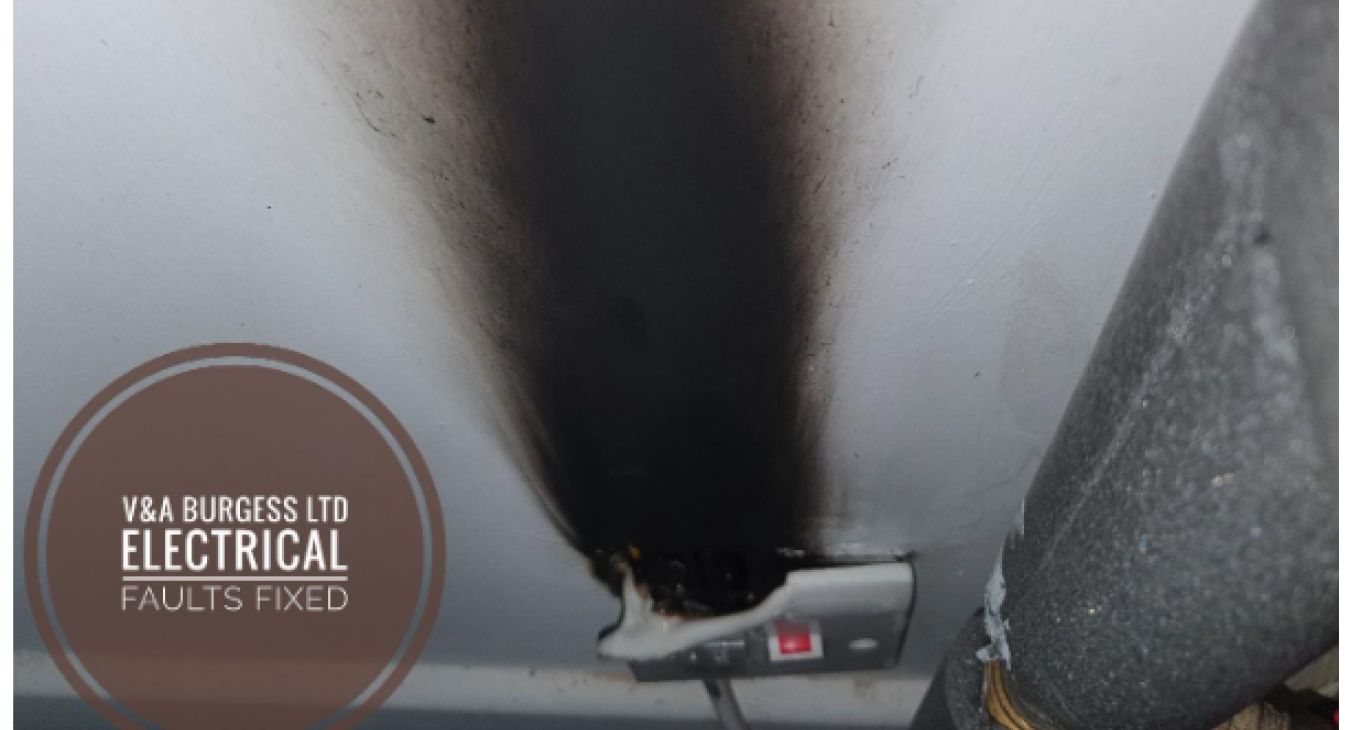WHAT DOES AN ELECTRICAL FIRE SMELL LIKE? Well, an electrical fire burning smell can like fish, burning plastic or a pungent sewer gas smell. The reasons for this are that electrical wiring is covered in a layer of flexible PVC insulation. When the wiring heats up, gets hot or burns, the PVC also gets hot and gives off chemical fumes as it smolders.
Back to top1) Immediate actions:
Turn off the power
Immediately locate your MAIN SWITCH which is the home’s main circuit breaker and shut off the power supply to your property. This will turn off all the lights, the plug sockets, and the other electrical supplies around your home. This action immediately stops the problem from getting worse and will allow the wiring to cool down.
Locate the source
It can be difficult to detect the source of electrical burning smells as they can emanate from almost anywhere. Underfloor junction boxes, back boxes, sockets, switches or even the fuse box can be causes of an electrical burning smell.
Another common place to discover the fishy smell is in the electric shower connections.
Prevent the problem reoccurring
Ensure that you have any electrical problems checked out and invest in thorough and regular inspections of the electrical system. Faulty wiring can be picked up by a professional electrician during an inspection and prevent any further damage from occurring.
2) Recognizing other indicators of electrical fire
2.1) Discoloration of electrical accessories
Where electrical outlets or other accessories have changed color, become dull or brown, there is a good indication that serious electrical issues are occurring. Do not ignore these warning signs, they are indicating potential fire hazards. For the front of accessories to discolor there must be significant heat behind them.
With metallic fixtures, check them for temperature. Electrical accessories and equipment should not be hot to the touch. A hot fuse box is an indication that there are signs of an electrical fire about to occur or in progress.
2.2) Cracking on Switch and Socket Faces
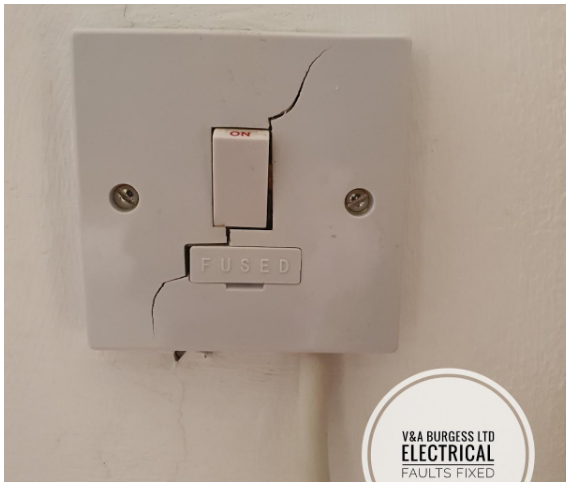
Where a socket has cracked possible causes could include impact damage, overtightened screws or burning occurring behind the plug socket. The socket cracks because of the heat that is generated by the melting at the rear on the terminations or due to internal high resistances.
2.3) Flickering Lights
Flickering lights can be an indication of loose wires at the consumer unit, fuse box, inside junction boxes or elsewhere on the electrical circuit. Loose wires cause fires and can be manifested as flickering lights.
Do not ignore a flickering light, intermittent socket operation or anything that appears to disrupt the flow of electricity as it is likely to be loose connections.
2.4) Crackling noises
Where there are crackling noises, there is likely electrical arcing going on. If a plug socket crackles then there are likely electrical fire risks present.
Electricity crackling is caused by electrical current passing through air. The process is incredibly hard for electrical current and the heat generated during the process due to extremely high resistance is considerable!
These high temperatures can result in the risk of an electrical fire, plastic insulation melting resulting in a fishy odor and significant damage to your electrical circuits and home.
Back to top3) Preventative Maintenance Measures
3.1) Upgrading the Electrical Panel
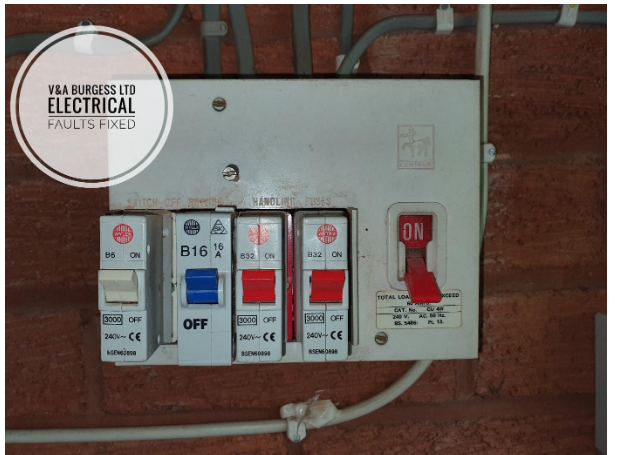
(Photo: Old Style Breaker Box)
Electrical equipment will not last forever and as technology improves for our electrical appliances, they require better protection at the electrical panel. An old breaker box won’t cut it anymore and you should have a qualified electrician in to change the panel for a new, modern equivalent that contains all the latest technology.
Whilst the electrician is there, they will likely check your home’s wiring before they install the new box. Older homes can harbor hidden electrical faults that old breaker boxes may not detect and as such a new electrical panel may trip when turned on if faults are present.
3.2) Certified Electrician Safety Checks
An electrical safety check is a sound investment and the best way to ensure that electrical installations are properly maintained. You should also consider performing some regular safety checks on your home yourself.
Whilst self-checks are not safe to carry out on the fixed wiring, they are a vital addition to ensuring that your home is electrically safe.
Also ensure that you test the GFCI (Ground Fault Circuit Interrupter) or RCD (Residual Current Device) trip switches at the panel or around the home. This life saving device needs to be checked occasionally to ensure that is it working correctly.
3.3) Replacing Old Wiring
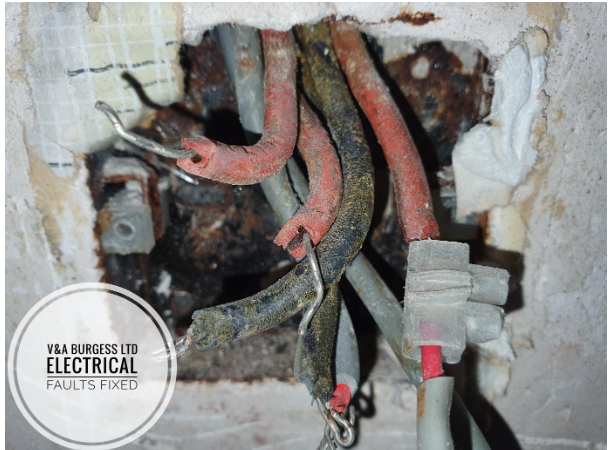
(Photo: Old Rubber Wiring)
Short Circuits, Earth Faults, Rodent Damage, Insulation Failure, and other issues can occur with old wiring.
Electrical wiring is one of the major electrical components that make up electrical installations. Worn-out wiring is likely to introduce a risk of electrical fires, electrical breakdowns, and serious inconvenience.
Have old wiring replaced when a licensed electrician tells you that its time, its best to carry out preventative maintenance like this than have a complete system breakdown at the most inconvenient time.
Back to top4) What are the common causes of fires?
There are several potential causes of electrical fires that include:
- An overloaded circuit
- Heat from light bulbs
- Loose connections
- Worn-out wires
- Faulty appliances
- Overloaded power strip
4.1) Overloaded Circuit
Where excessive demand is placed upon one circuit from too many connected electrical devices, wiring, circuit breakers and electrical accessories can overheat causing a burning smell.
Where circuit overload occurs frequently, appliances should be moved and split across different circuits to spread the electrical load more safely.
4.2) Heat from light bulbs
LED light bulbs use a lot less power than older style bulbs and do not generate as much heat. Where you have older style light bulbs in your property, these can get very hot and, if the fixture is installed too close to wiring or other objects, electrical fire is a risk.
If you smell a burning odor in your home, check around the light fittings for signs of thermal damage.
4.3) Loose connections
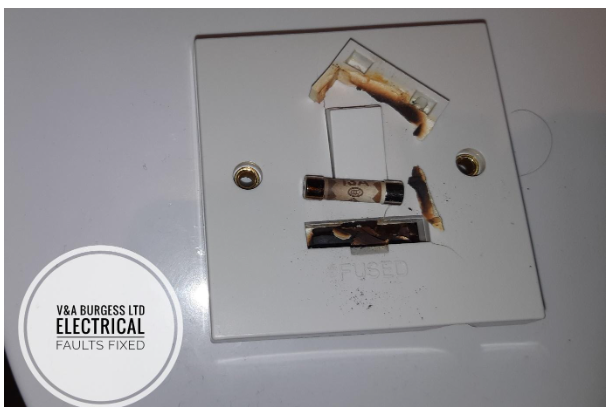
Where there is a loose connection in your wiring system, excessive heat can build up as electricity struggles to flow. There is usually a crackling or buzzing sound that accompanies loose connections but not always.
Immediate attention should be given to areas where loose connections are suspected. Call a professional, experienced electrician out to investigate what is happening. As loose connections tend to happen over time, there is a chance that there are other electrical connections that are affected throughout the property.
It is a good idea to have an electrical inspection carried out to determine if there may be other loose wiring in the electrical system.
4.4) Worn-out wires
Where wires have served their useful life in an electrical system, you may notice an electrical fire smell occurring under heavy load. This is an acrid smell or foul smell that may resemble fish as the toxic fumes spill out of outlets and switches.
Cable insulation will fail over time resulting in overheating, short circuits, and electrical shock risk. Worn-out wires should be replaced before this begins to happen and should certainly not be used once a persistent burning smell is present.
4.5) Faulty appliances
Electrical appliances can and do go wrong from time to time. Where an appliance is faulty or old, you may notice a burning electrical smell from the appliance. This is common where appliances have motors, heating elements or other power-hungry electrical parts.
4.6) Overloaded power strip
Great care should be taken to avoid potential hazards related to power strips. A power strip can handle a limited amount of electrical current and as such, check you are not overloading the extension cord, plug top or power strip.
Back to top5) Summary
An electrical fire smells rather bad and once you have experienced the smell you will not forget it. Bad smells like a plastic smell, fishy smell or chemical smell can all potentially mean that an electrical fire is brewing somewhere.
Taking immediate action is vital to ensure that the fire does not spread and excessive damage does not occur to the electrical system or property.
Its always a good idea to have a fire extinguisher in the home in case a fire does break out. Make sure to get the right type and size but never tackle an electrical fire that is too large. The local fire department should always be called for professional help.
Read more articles
- Log in to post comments

